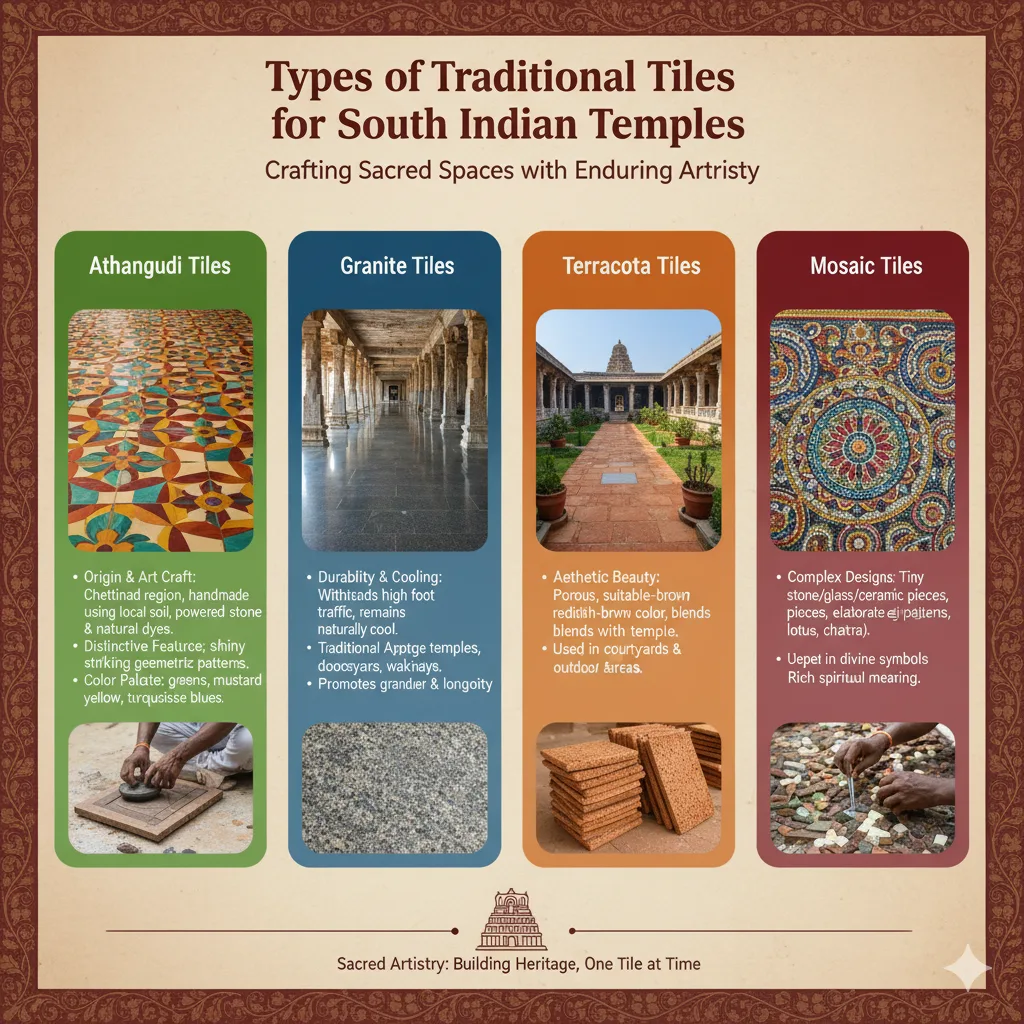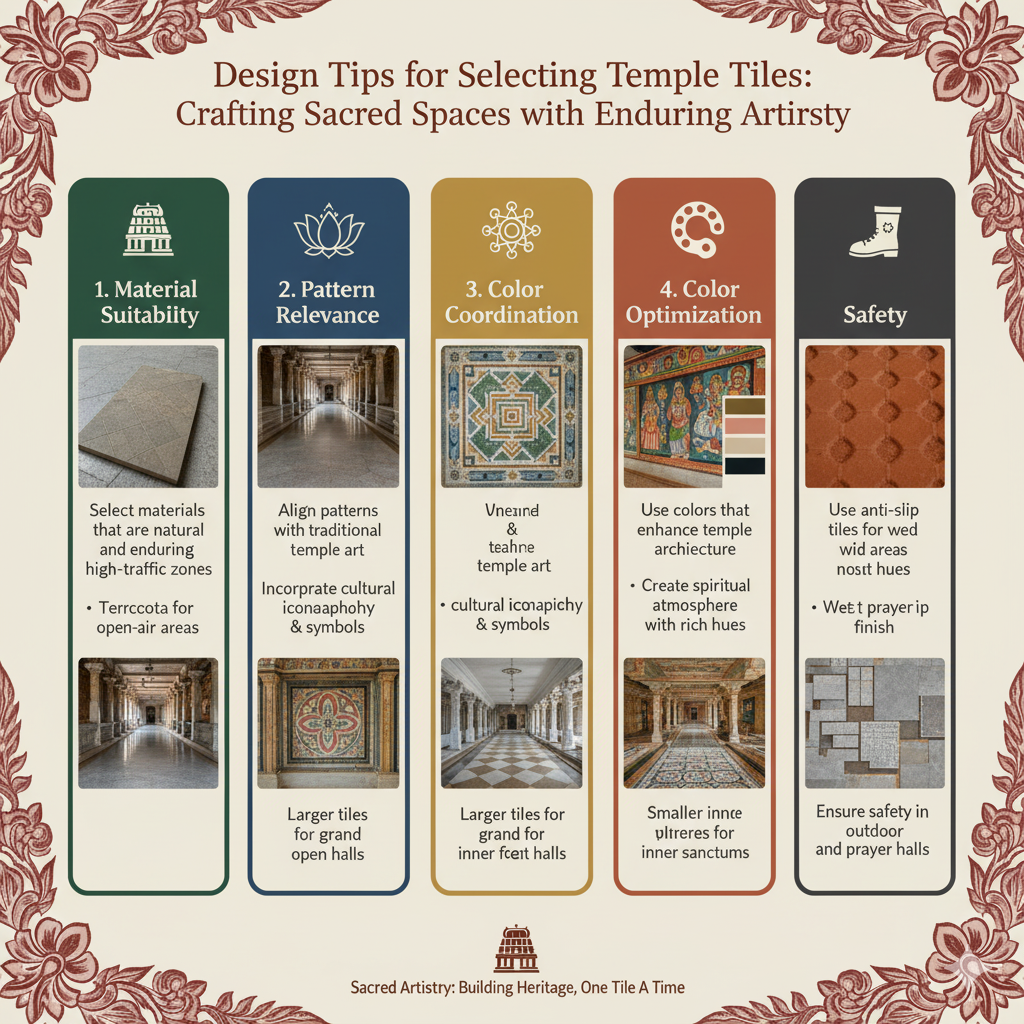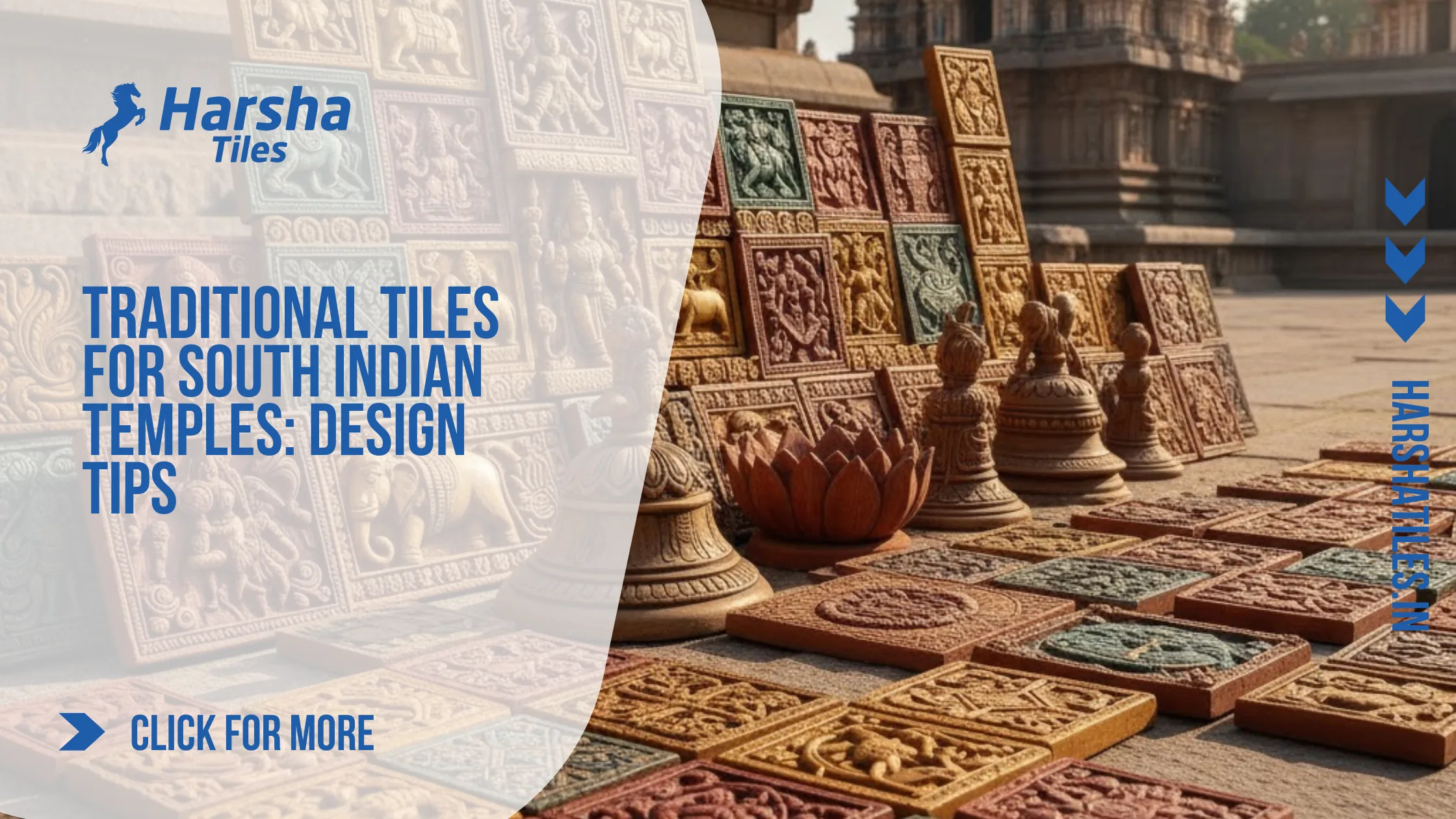Jan 08, 2026
Connect With Our Team
Traditional Tiles for South Indian Temples: Design Tips
- Home
- Utilities
- News & Blog
South Indian temples are not a place of worship only, they are the masterpieces of architecture, art, and spirituality. Even gopurams, ornamented sanctums, are carved with a great degree of detail and a lot of cultural and symbolic significance. Among these specifics, traditional tiles can be of great value in terms of conserving the originality and magnificence of these sacred areas.
It could be the restoration of an old temple or building a new one in the Dravidian tradition, but when it comes to preserving a visual harmony and keeping the cultural traditions intact, the selection of the Traditional Tiles for South Indian Temples can be the key factor in this matter.
What Makes South Indian Temple Architecture Unique?
The South Indian temples are famous because of their splendor and accuracy. They are built by the Dravidian architecture, with high gateways (gopurams), carved with high-level detail on the pillars and symmetrical courts. There are natural resources such as granite, laterite, and terracotta that have been used to supplement the warm and humid climate of the region.
The patterns in the tiles in such temples commonly depict sacred geometry, flowers and mythological themes- all of which symbolize purity and divine energy.
Why Are Traditional Tiles the Best Choice for South Indian Temples?
The use of traditional tiles aligns with both aesthetic and functional needs of temples. These tiles:
-
Withstand heavy footfall: Temples receive thousands of visitors every month, and have to be made of durable materials.
-
Resist heat and humidity: South India is a tropical area and the tiles used must resist the intense weather.
-
Retain heritage appeal: The aged look and handcrafted appearance of old-fashioned tiles are in line with the temples.
-
Require minimal maintenance: Natural composition of the material makes them easy to clean and re-use.
Types of Traditional Tiles for South Indian Temples

Athangudi Tiles
-
Origin and art craft: Athangudi tiles were made in Chettinad region and are hand made using local soil, powdered stone and natural dyes.
-
Distinctive features: Shiny surface, striking geometric or flowery patterns.
-
Color palette: Vivid reds, green, mustard yellow and turquoise blues that present vigor.
Granite Tiles
-
Durability and cooling properties: Granite withstands high foot traffic and naturally remains cool.
-
Traditional application: It was widely used in the halls of large temples, doorways and walkways with an aim of promoting grandeur.
Terracotta Tiles
-
Natural cooling properties: Terracotta tiles have porous properties and hence a natural cooling layer that is suitable in the tropical climate.
-
Aesthetic beauty: They have a warm reddish-brown color that matches the color of the temples and planted courtyards.
Mosaic Tiles
-
Complex designs: Mosaics are made of tiny stone, glass or ceramic pieces to create elaborate religious patterns.
-
The use of symbolism: a lot of symbol patterns depict divine symbols such as the lotus or chakra, which is in line with the spiritual beliefs.
Design Elements and Patterns
The Traditional temple tiles are sometimes symmetrical in geometry with a combination of motives that depict nature. Lotus is used to signify purity and spiritual awakening, jasmine is used to signify divine fragrance and temple-inspired borders are used to signify classical dravidian artistry. The central patterns are framed by borders and corner tiles which brings about the visual harmony in the floor plan.
Common elements include:
-
Geometric patterns: Squares, diamonds, symmetrical grids of hexagonal designs.
-
Flower patterns: Jasmine, lotus blossoms.
-
Temple inspired borders: Huge carvings in tile shape were copied on thresholds and perimeters of sanctums.
Color Schemes for Temple Tiles
The use of colors in the temple's floors is very symbolic. Combination as with traditional South Indian designs may include:
-
Red and yellow: The color represents happiness and purity.
-
Green and gold: These colours are related to fertility and divine blessings.
-
Blue and white: Connotes tranquility and religious receptiveness.
Contemporary versions may also adopt subdued colors, with the traditional combinations, to maintain the continuation of traditions.
Design Tips for Selecting Temple Tiles

When selecting tiles for temple spaces, consider the following:
-
Material suitability: Select materials that are natural and enduring such as granite or Athangudi that would be used in high traffic zones and terracotta that would be applied in the open air localities.
-
Pattern relevance: Use patterns that are in line with the traditional temple art and cultural iconography.
-
Color coordination: Employ the colors, which give the temple better architecture and spiritual atmosphere.
-
Space optimization: Larger tiles will give great effect to open halls of greater space and smaller patterned tiles to the inner sanctums.
-
Safety: Use anti-slips area outside and prayer hall.
Installation and Maintenance Guidelines
-
Preparation: Level the subfloor and ensure moisture resistance where necessary.
-
Installation best practices: Use traditional lime mortar or modern adhesives depending on tile type; align patterns precisely for symmetry.
-
Long-term care: Regular cleaning with mild solutions, prompt repair of chipped edges, and periodic sealing for porous materials like terracotta.
Conclusion
Traditional tiles are not just decorative they are carriers of culture, faith, and artistry that connect the present to centuries of South Indian heritage. Whether it’s the timeless elegance of granite, the handcrafted charm of Athangudi, or the earthy beauty of terracotta, these tiles continue to define the sacred geometry of temples.
By blending traditional craftsmanship with modern design techniques, today’s architects can preserve the spiritual essence of temple architecture while ensuring durability and functionality for generations to come.
Harsha Tiles, with its extensive range of traditional and contemporary tile options, provides a perfect blend of aesthetic appeal and functionality. Their commitment to quality and craftsmanship makes them a trusted choice for homeowners looking to create a sacred space that resonates with peace and devotion.
Whether you're renovating an existing pooja room or designing a new one, Harsha Tiles offers the expertise and variety to help you select the perfect tiles that align with your vision and spiritual needs.
Latest Blogs
Got questions? Fill out the form and get in touch with us!
Harsha Tiles
21,22 Cowley Brown Road ,
R.S. Puram,Coimbatore – 641002.
2026 Harsha Tiles | Design And Managed By : LLS - INDIA
Whatsapp Chatx
Hi! Click one of our representatives below to chat on WhatsApp or send us email to info@harshatiles.in
 |
Mr Saleem +91 82702 80707 |
 |
Mr Martin +91 78688 86655 |

We will love to hear from you!


